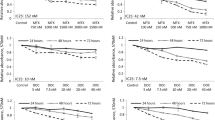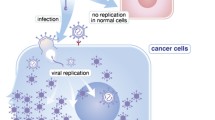Abstract
Based on the frequent inactivation of the p53 gene product in human malignancy, and its functional involvement in tumor suppression, cell cycle control and apoptosis, p53 was identified as an attractive target for somatic gene therapy strategies in cancer. Several pilot and phase I studies explored the intratumoral injection of viral expression vectors encoding the p53 cDNA in patients with advanced cancer. These studies confirmed the safety and feasibility of this approach. Further, vector-specific transgene expression and surrogate markers for biological activity of the transgene were demonstrated. Local tumor regression, or stabilization of tumor growth, were observed in some studies, and were interpreted as evidence for clinical activity. No formal assessment of in vivo transduction efficacy and vector distribution, following intratumoral injection of p53 expression vectors, was performed.
The instillation of adenoviral p53 expression vectors into cavitary organs, such as the peritoneum or the bladder, has been studied as an alternative mode of application. Intravesical p53 vector installation, in combination with a transduction-enhancing agent, proved to be safe, feasible and biologically active in a phase I study of patients with bladder cancer. Transgene expression, following vector installation, was superior to intratumoral vector injection in this trial, and effective vector distribution and penetration were achieved by the former treatment. The publication of results from the studies of intraperitoneal vector installation in patients with ovarian cancer is still awaited.
To date, only one published phase II study has formally assessed the clinical efficacy of adenovirus-mediated p53 gene transfer in patients with advanced non-small cell lung cancer (NSCLC). No clinically relevant benefit of local p53 gene therapy was identified in patients undergoing systemic chemotherapy when local responses of individual tumor lesions treated with intratumoral vector were compared. The results from additional efficacy studies performed in patients with NSCLC or head and neck cancer are pending.
In summary, current studies failed to translate the preclinical success of intratumoral p53 vector injection into the clinic. A major obstacle is the unknown, and probably inefficient, vector delivery following intratumoral injection. In contrast, an effective delivery can be achieved by intravesical instillation of a p53 expression vector in patients with bladder cancer. These results merit further investigation in phase II studies. Recent improvements in vector technology, including targeting techniques, tissue-specific transgene expression andtumor-selective vector replication, will certainly allow investigators to study the efficacy of p53 gene therapy in a next wave of carefully conducted clinical trials.

Similar content being viewed by others
References
Hollstein M, Rice K, Greenblatt MS, et al. Database of p53gene somatic mutations in human tumors and cell lines. Nucleic Acids Res 1994; 22: 3551–5
Vogelstein B, Lane D, Levine AJ. Surfing the p53 network. Nature 2000; 408: 307–10
Lowe SW, Ruley HE, Jacks T, et al. p53-dependent apoptosis modulates the cytotoxicity of anticancer agents. Cell 1993; 74: 957–67
Schmitt CA, McCurrach ME, de Stachina E, et al. INK4a/ARF mutations accelerate lymphomagenesis and promote chemoresistance by disabling p53. Genes Dev 1999; 13: 2670–7
Quinlan DC, Davidson AG, Summers CL, et al. Accumulation of p53 protein correlates with a poor prognosis in human lung cancer. Cancer Res 1992; 52: 4828–31
Nishio M, Koshikawa T, Kuroishi T, et al. Prognostic significance of abnormal p53 accumulation in primary, resected non-small-cell lung cancers. J Clin Oncol 1996; 14: 497–502
Ohsaki Y, Toyshima E, Fujiuchi S, et al. bcl-2 and p53 protein expression in non-small cell lung cancers: correlation with survival time. Clin Cancer Res 1996; 2: 915–20
Esrig D, Elmajian D, Groshen S, et al. Accumulation of nuclear p53 and tumor progression in bladder cancer. N Engl J Med 1994; 331: 1259–64
Dohner H, Fischer K, Bentz M, et al. p53 gene deletion predicts for poor survival and non-response to therapy with purine analogs in chronic B-cell leukemias. Blood 1995; 85: 1580–9
Yin Y, Tainsky MA, Bischoff FZ, et al. Wild-type p53 restores cell cycle control and inhibits gene amplification in cells with mutant p53 alleles. Cell 1992; 70: 937–48
Fujiwara T, Grimm EA, Mukhopadhyay T, et al. Induction of chemosensitivity in human lung cancer cells in vivo by adenovirus-mediated transfer of the wild-type p53 gene. Cancer Res 1994; 54: 2287–91
Nielsen LL, Dell J, Maxwell E, et al. Efficacy of p53 adenovirus-mediated gene therapy against human breast cancer xenografts. Cancer Gene Ther 1997; 4: 129–38
Roth JA, Nguyen D, Lawrence DD, et al. Retrovirus-mediated wild-type p53 gene transfer to tumors of patients with lung cancer. Nat Med 1996; 2: 985–91
Schuler M, Rochlitz C, Horowitz JA, et al. Aphase I study of adenovirus mediated wild type p53 gene transfer in patients with advanced non-small cell lung cancer. Hum Gene Ther 1998; 9: 2075–82
Boulay JL, Perruchoud AP, Reuter J, et al.p21 gene expression as an indicator for the activity of adenovirus-p53 gene therapy in non-small cell lung cancer patients. Cancer Gene Ther 2000; 7: 1215–9
Clayman GL, El-Naggar AK, Lippman SM, et al. Adenovirus-mediated p53 gene transfer in patients with advanced recurrent head and neck squamous cell carcinoma. J Clin Oncol 1998; 16: 2221–32
Clayman GL, Frank DK, Bruso PA, et al. Adenovirus-mediated wild-type p53 gene transfer as a surgical adjuvant in advanced head and neck cancers. Clin Cancer Res 1999; 5: 1715–22
Swisher SG, Roth JA, Nemunaitis J, et al. Adenovirus-mediated p53 gene transfer in advanced non-small-cell lung cancer. J Natl Cancer Inst 1999; 91: 763–71
Nemunaitis J, Swisher SG, Timmons T, et al. Adenovirus-mediated p53 gene transfer in sequence with cisplatin to tumors of patients with non-small-cell lung cancer. J Clin Oncol 2000; 18: 609–22
Schuler M, Herrmann R, De Greve JLP, et al. Adenovirus-mediated wild-type p53 gene transfer in patients receiving chemotherapy for advanced non-small-cell lung cancer: results of a multicenter phase II study. J Clin Oncol 2001; 19: 1750–8
Kuball J, Wen SF, Leissner J, et al. Successful adenovirus-mediated wild-type p53 gene transfer in patients with bladder cancer by intravesical vector instillation. J Clin Oncol. In press
Wills KN, Maneval DC, Menzel P, et al. Development and characterization of recombinant adenoviruses encoding human p53 for gene therapy of cancer. Hum Gene Ther 1994; 5: 1079–88
Engler H, Anderson SC, Machemer TR, et al. Ethanol improves adenovirus-mediated gene transfer and expression to the bladder urothelium of rodents. Urology 1999; 53: 1049–53
Connor RJ, Engler H, Machemer T, et al. Identification of polyamines that enhance adenoviral-mediated gene expression in the urothelium. Gene Ther 2001; 8: 41–8
DummerR, Bergh J, Karlsson Y, et al. Biological activity and safety of adenoviral vector-expressed wild-type p53 after intratumoral injection in melanoma and breast cancer patients with p53-overexpressing tumors. Cancer Gene Ther 2000; 7: 1069–76
Venook AP, Bergsland EK, Ring E, et al. Gene therapy of colorectal liver metastases using arecombinant adenovirus encoding wt p53 (SCH 58500) viahepatic artery infusion: a phase I study [abstract]. Proc ASCO 1998; 16: 61
Rosenwirth B, Kuhn EM, Heeney JL, et al. Safety and immunogenicity of ALVAC wild-type human p53 (vCP207) by the intravenous route in rhesus macaques. Vaccine 2001; 19: 1661–70
Bischoff JR, Kirn DH, Williams A, et al. An adenovirus mutant that replicates selectively in p53-deficient human tumor cells. Science 1996; 274: 373–6
Ries S J, Brandts CH, Chung AS, et al. Loss of pl4ARF in tumor cells facilitates replication of the adenovirus mutant dll520 (ONYX-015). Nat Med 2000; 6: 1128–33
Khuri FR, Nemunaitis J, Ganly I, et al. A controlled trial of intratumoral ONYX-015, a selectively-replicating adenovirus, in combination with cisplatin and 5-fluorouracil in patients with recurrent head and neck cancer. Nat Med 2000; 6: 879–85
Minna JD, Gazdar AF. Translational research comes of age. Nat Med 1996; 2: 974–5
Acknowledgements
Supported by the Max-Eder-Program of the Deutsche Krebshilfe (70-2952), and by a grant from Schering-Plough Research Institute.
Author information
Authors and Affiliations
Corresponding author
Rights and permissions
About this article
Cite this article
Schuler, M. p53 Gene Therapy. Am J Cancer 1, 3–6 (2002). https://doi.org/10.2165/00024669-200201010-00001
Published:
Issue Date:
DOI: https://doi.org/10.2165/00024669-200201010-00001




